

Microsoft to reboot tablet effort with new Surface. A year after its flubbed tablet introduction, Microsoft is back with a new Surface.
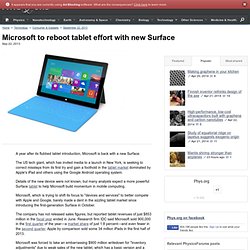
The US tech giant, which has invited media to a launch in New York, is seeking to correct missteps from its first try and gain a foothold in the tablet market dominated by Apple's iPad and others using the Google Android operating system. Details of the new device were not known, but many analysts expect a more powerful Surface tablet to help Microsoft build momentum in mobile computing. Microsoft, which is trying to shift its focus to "devices and services" to better compete with Apple and Google, barely made a dent in the sizzling tablet market since introducing the first-generation Surface in October. The company has not released sales figures, but reported tablet revenues of just $853 million in the fiscal year ended in June. Research firm IDC said Microsoft sold 900,000 in the first quarter of the year—a market share of just 1.8 percent—and even fewer in the second quarter.
Jack Gold, analyst at J. Privacy Scandal: NSA Can Spy on Smart Phone Data. The United States' National Security Agency intelligence-gathering operation is capable of accessing user data from smart phones from all leading manufacturers.

Top secret NSA documents that SPIEGEL has seen explicitly note that the NSA can tap into such information on Apple iPhones, BlackBerry devices and Google's Android mobile operating system. The documents state that it is possible for the NSA to tap most sensitive data held on these smart phones, including contact lists, SMS traffic, notes and location information about where a user has been. Introducing Trinket. Trinket may be small, but do not be fooled by its size!
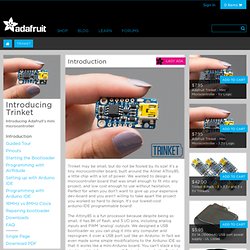
It's a tiny microcontroller board, built around the Atmel ATtiny85, a little chip with a lot of power. We wanted to design a microcontroller board that was small enough to fit into any project, and low cost enough to use without hesitation. Perfect for when you don't want to give up your expensive dev-board and you aren't willing to take apart the project you worked so hard to design. Samsung unveils new smartwatch that makes calls (Update) Nearly 70 years after Dick Tracy began wearing a two-way wrist radio in the funny pages, the technology that once seemed impossibly futuristic will be widely available by Christmas.
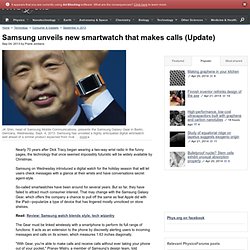
Samsung on Wednesday introduced a digital watch for the holiday season that will let users check messages with a glance at their wrists and have conversations secret agent-style. So-called smartwatches have been around for several years. But so far, they have failed to attract much consumer interest. That may change with the Samsung Galaxy Gear, which offers the company a chance to pull off the same as feat Apple did with the iPad—popularize a type of device that has lingered mostly unnoticed on store shelves. Read: Review: Samsung watch blends style, tech wizardry The Gear must be linked wirelessly with a smartphone to perform its full range of functions. Sony and Qualcomm also introduced smartwatches Wednesday. Multi-channel Acoustic Data Transmission to Ad-hoc Mobile Phone Arrays.
Phones jointly decode the received data, acting as an array, which greatly improves the quality of the communication channel.
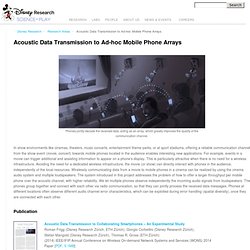
Miiverse to come to smartphones and PC by May, 3DS version in the works. Nintendo's social "empathy" network for the Wii U, Miiverse, will come to smartphones and web browsers sometime in April or May, with a 3DS version to follow at a later date.
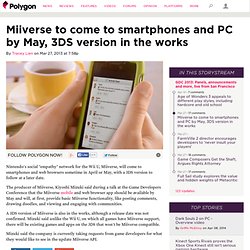
The producer of Miiverse, Kiyoshi Mizuki said during a talk at the Game Developers Conference that the Miiverse mobile and web browser app should be available by May and will, at first, provide basic Miiverse functionality, like posting comments, drawing doodles, and viewing and engaging with communities. The growing push to track your location indoors. Apple buy highlights growing "indoor GPS" capabilitiesTools give users directions inside malls, hospitals, convention hallsTech combines GPS with accelerometers, compasses in phonesPrivacy is a concern for some potential users (CNN) -- Sure, the GPS on your phone or dedicated device can get you from Point A to Point B on the interstate, frustrating "Calibrating ... calibrating ...
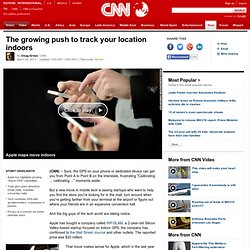
" moments aside. But a new move in mobile tech is seeing startups who want to help you find the store you're looking for in the mall, turn around when you're getting farther from your terminal at the airport or figure out where your friends are in an expansive convention hall. And the big guys of the tech world are taking notice.
Apple has bought a company called WiFiSLAM, a 2-year-old Silicon Valley-based startup focused on indoor GPS, the company has confirmed to the Wall Street Journal and other outlets. The reported price was $20 million. Apple named most valuable brand Apple CEO remains confident with company. Hands-on with Ubuntu's brand-new, gesture-based phone OS. Our top London agent Vlad Savov just got his hands on the new Ubuntu phone OS and was able to get a quick look at some of the new OS's trademark features, including its new gesture-based interface.
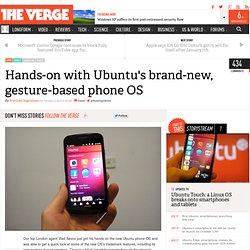
There's a bit of lag while swiping through the phone's different panels, but overall it looks to be quite the attractive and intelligent interface. Unlike nearly all of the major phone operating systems, there's no "home" button to speak of in Ubuntu — it's all based on gestures. There's also no "lock screen" to speak of; users can just swipe in from the edges to access their content any time, rather than having to get past a gatekeeper sort of screen before accessing their apps. Swiping down from the top can bring up a variety of menus, including messaging and settings, depending on where exactly you swipe.